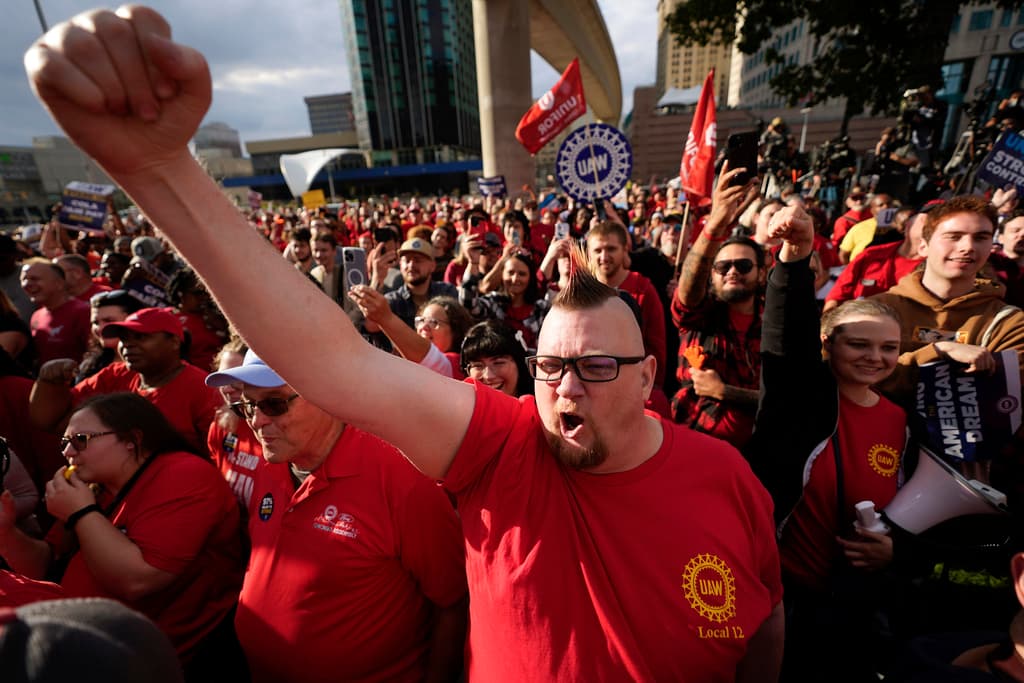Biden Backing UAW on Demands for Wages That Would Give Elon Musk and Xi Jinping the Last Laugh
We need a president who understands — and lives in — the real world.

In Joe Biden’s 1950s world, unions are good and corporations bad. Hence his response to the UAW strike against the three legacy automakers. “Over the last — the past decade,” he said, “auto companies have seen record profits, including the last few years, because of the extraordinary skill and sacrifices of the UAW workers.”
Yet, the president said, “those record profits have not been shared fairly, in my view, with those workers.” He added, referring to current negotiations: “I believe they should go further to ensure record corporate profits mean record contracts for the UAW.” Nothing like putting the presidential thumb on the bully scale.
In Mr. Biden’s world, because the automakers have had a few good years, they should award unionized employees huge pay hikes. Never mind that if our economy slows and demand for cars slumps, the auto firms would be stuck with higher costs that would make them even less competitive with non-union companies like Tesla or BYD in Communist China.
Nikki Haley says presidential candidates should have mental competency tests; business IQ tests might be more useful, starting with the “sacrifices” made by autoworkers that Mr. Biden hails. It is true that during the Great Recession UAW members accepted changes in contract terms that allowed the auto makers to stay in business.
Taxpayers, already being crushed by government levies, forked over $80 billion to bail out GM and Chrysler. Much of that was eventually paid back. The country was largely sympathetic; after all, it was banks that had caused the 2008 downturn, so why should Detroit’s Big Three and their employees suffer?
It turned out, though, that the problems of the automakers went way beyond the difficulties posed by the recession. When the Times reported that GM employees were making all-in pay of $70 an hour, including wages and benefits, or roughly $10 to $20 more an hour than non-union labor in car factories, their support evaporated.
Everyone understood that a pay structure so out of whack with the going rate for labor (remember, this was 15 years ago) was uncompetitive and — yes — unsustainable. Especially in an era of free trade and international competition.
Today, the UAW wants the Big Three to scrap some of the terms agreed to after the financial crisis, like the two-tier pay scale that allowed retiring employees to be replaced with new entrants earning more reasonable pay.
They are also asking for a 30%-plus wage hike (down from the initial ask of 46%), a 32-hour work week (with 40 hours of pay) and other perks that are unacceptable and the union knows it. But…they have nothing to lose.
The UAW is not just fighting for higher pay; they are fighting for survival. Because Joe Biden is demanding that 67% of all cars sold in the U.S. by 2032 be all-electric, and because producing an EV takes 40% less labor, the UAW is looking at a long-term decline in membership.
As assembly lines shrink, Joe Biden imagines that battery plants will create an offsetting demand for help. But those new battery factories are largely being built in states where employers can hire non-union labor. GM’s union-friendly battery joint venture in Michigan is being subsidized by a $2.5 billion loan from the government and you, the taxpayer.
The fight over pay will determine whether Detroit’s legacy automakers will survive as profit-making enterprises or whether they will evolve into long-term wards of the state. Already Biden’s green ambitions are being supported by taxpayers on the hook for hundreds of billions of dollars in EV subsidies and tax credits; that underpinning will likely grow.
Chinese automakers are flooding the EU with cheap electric vehicles; eventually, they will come here, selling cars at roughly half the average $55,000 price of American-made EVs. The UAW argues that pay to Big Three executives has gone up 40 percent over the past decade, while their average pay of $28 an hour hasn’t kept pace.
It is true workers have been left behind because of President Biden’s inflation, and UAW members have been further disadvantaged by the deal reached in 2008. But the union’s demands are impossible.
Hourly labor costs for the Big Three today, including wages and benefits, average $66 an hour, compared to $45 an hour at Tesla and a fraction of that at a Chinese plant. The UAW’s demands would boost pay to $136. Does Joe Biden think that GM, Ford and Stellantis can afford that?
Joe Biden has no idea. His zealous push for EVs and encouragement of the UAW demands could very well lead to the collapse of both our auto industry and the union. He said in his remarks, “we need labor agreements for the future.” Yes, we do Mr. Biden and also a president who lives in the real world.

